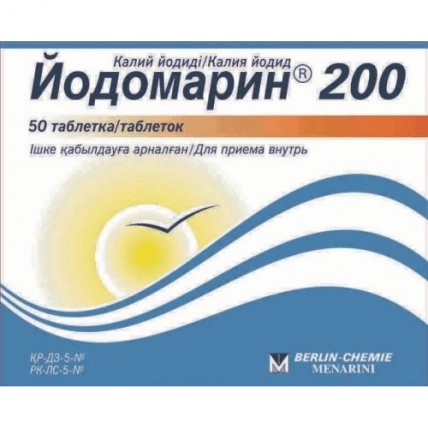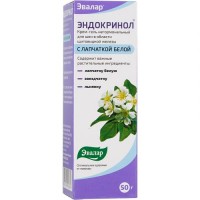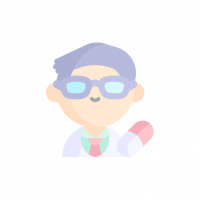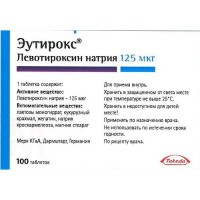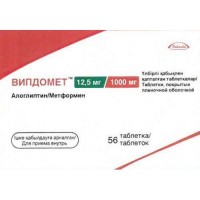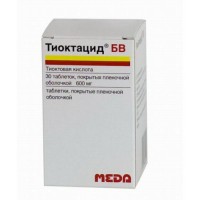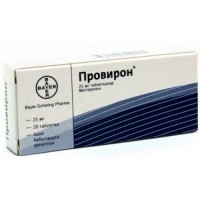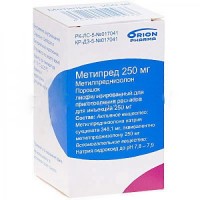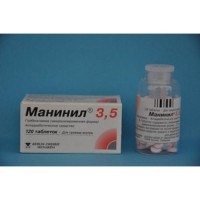Jodomarin 200 mcg (50 tablets)
- $9.00
The instruction for medical use of Йодомарин® 200 medicine the Trade name Йодомарин® 200 International unlicensed name of Potassium iodide the Dosage form of the Tablet of 200 mkg Structure One tablet contains active agent - potassium iodide of 0.262 mg (200 mg are equivalent to iodine 0), excipients: lactoses monohydrate, magnesium carbonate of the main easy, gelatin, sodium carboxymethylstarch, type A, silicon dioxide anhydrous, magnesium stearate. The description of the Tablet from white till almost white color, with a flat surface, with a facet and risky on one party. Pharmacotherapeutic group Drugs for treatment of diseases of a thyroid gland. Iodine drugs. The ATX H03CA code the Pharmacological Pharmacokinetics Usually properties iodine gets to an organism through digestive tract, but can arrive also through skin and from perigastriums. It needs to be considered especially at wrong medicamentous administration of iodine. At intake it is quickly soaked up from digestive tract. It is widely distributed in all fabrics and fluid mediums of an organism. Inorganic iodine is soaked up in a small intestine nearly 100%, and through skin – is insignificant and uncontrollable. Distribution volume at healthy people averages about 23 liters (38% of body weight). Indicators of content of inorganic iodine in blood serum usually are in an interval between 0.1 and 0.5 mkg/dl. In an organism iodide collects in a thyroid gland and other fabrics, such as sialadens, chest glands and stomach. In saliva, gastric juice and in milk the concentration of iodide is 30 times higher than its concentration in blood plasma. The removal of iodine with urine specified most often in creatinine mkg/g serves as criterion of iodic providing as in the balanced state it corresponds to daily intake of iodine with food. The Action pharmacodynamics which renders it is exogenous the entered iodine on a human body, depend on the accepted amount of iodine in day, on a type of iodinated drug and also on a condition of a thyroid gland (healthy body, a latent or manifest disease). As the element participating in synthesis of hormones of a thyroid gland - thyroxine and triiodothyronine - iodine is an essential component of food. The need for it, i.e. that amount of iodine which has to come daily to an organism to prevent development of an endemic craw, makes about 100 - 150 mkg a day. The amount of iodine recommended to WHO which has to come daily to an organism is 150 - 300 mkg. After iodine absorption in the electrochemical way (yodination) in epithelial cells of follicles of a thyroid gland there is an oxidation by the peroxide of hydrogen (H2O2) which is kosubstraty, catalyzed by enzyme iodide-peroxidase from which elementary iodine is emitted. At the same time a part of tirozinovy groups of glucoprotein (thyreoglobulin) is iodated in provisions 3 and, partially, the 5th aromatic ring (yodization). As a result of oxidizing condensation the iodated groups of tyrosine unite, forming a framework of a tironin. Key products are thyroxine (T4) and triiodothyronine (T3). The complex formed thus 'tironin – thyreoglobulin' is allocated as depot form of hormone of a thyroid gland in a colloid of its follicle. Physiological amounts of iodine (up to 300 mkg) prevent formation of a craw which develops owing to an iodine deficiency, contribute to normalization of the sizes of a thyroid gland at newborns, children and teenagers and also influence a number of the broken biochemical parameters (T3/T4 coefficient, the TSH level). Indications - prevention of an iodine deficiency (for example, for prevention of an endemic craw and after a resection of the craw caused by an iodine deficiency) - treatment of the diffusion euthyroid craw caused by an iodine deficiency in children, including chest of teenagers and at adults at young age are the Route of administration and doses Prevention of iodine deficiency diseases (in cases of insufficient intake of the alimentary iodine in an organism making not less than 150-300 mkg a day): Babies, children of 2 - 12 years – ½ tablets a day Йодомарин® 200 (that corresponds about 100 mkg of iodine) Children of 12 years and adult – from ½ to 1 tablets Йодомарин® 200 (that corresponds to 100 - 200 mkg of iodine) a day Pregnant and feeding: 1 tablet Йодомарин® 200 (that corresponds to 200 mkg of iodine) a day Prevention of a recurrence after operation for an euthyroid craw or its drug treatment: ½ up to 1 tablet Йодомарина® 200 once a day (that corresponds to 100-200 mkg of iodine). Treatment of an euthyroid craw: Newborns, children and teenagers – from ½ to 1 tablets Yodomarina®200 of mkg (that corresponds to 100-200 mkg of iodine) a day Adult at young age – from 1 ½ up to 2 ½ tablets Йодомарина® 200 (that corresponds to 300-500 mkg of iodine) a day the Preventive reception Йодомарин® 200 has to be carried out usually within several years, is frequent - during all life. For treatment of a craw newborns in most cases have enough 2-4 weeks, at children, teenagers and adults 6-12 months or more usually are required. Duration of use of drug is determined by the attending physician under control of level of iodine in blood. The drug is taken after a meal, washing down with enough liquid. To children, including newborns, it is recommended to pound and dissolve previously drug in a small amount of milk or water. Very seldom - in the presence in a thyroid gland of larger autonomous sites and at daily doses, components more than 150 mkg of iodine, a hyperthyroidism can pass side effects into a manifest form - at use of drug in the dose exceeding 300-1000 mkg of iodine a day the development of a hyperthyroidism (especially at the elderly patients having a craw for a long time, in the presence of a nodal or diffusion toxic craw) Contraindications - hypersensitivity to active ingredient or one of other components of drug - a manifest hyperthyroidism - a latent hyper thyroidism in doses of the exceeding 150 mkg of iodine a day is possible - toxic adenoma of a thyroid gland, a nodal craw (at use in doses from 300 to 1000 mkg/days), except for a preoperative yodoterapiya for the purpose of blockade of a thyroid gland according to Plummer) Medicinal interactions raises the Iodine deficiency, and the excess of iodine lowers reaction to therapy of a hyperthyroidism thyreostatic means, in this regard before treatment or during treatment of a hyperthyroidism recommend to avoid, whenever possible, any intake of iodine. Thyreostatic means, in return, slow down transition of iodine to organic compound in a thyroid gland and, thus, can cause formation of a craw. Iodine absorption by a thyroid gland competitively is suppressed with substances which implementation in a thyroid gland happens on the same mechanism of 'capture', as well as iodide implementation (for example, perchlorate which, in addition, slows down recirculation of iodine in a thyroid gland) and also substances which in itself are not transported such as thiocyanate in the concentration exceeding 5 mg/dl. Iodine absorption by a thyroid gland and its exchange are stimulated in it with endogenous and exogenous thyroid stimulating hormone (TSH). Simultaneous treatment by the high doses of iodine suppressing an inkretion of hormones of a thyroid gland, and salts of lithium can promote developing of a craw and a hypothyroidism. Higher doses of potassium of iodide in combination with kaliysberegayushchy diuretics can lead to a hyperpotassemia. Special instructions drug Йодомарин® 200 contains lactose. The patients suffering inborn neperenosimomtyyu galactoses, deficit in an organism of lactase or a syndrome of malabsorption of glucose and a galactose Yodomarin ® 200 should not accept. Pregnancy and the period of a lactation during pregnancy and during feeding by a breast the need for iodine increases therefore intake of iodine in an organism is especially important sufficient (200 mkg a day). Due to the diaplacental transition of iodine and sensitivity of a fruit to pharmacological its active doses, iodine is not recommended to appoint in the milligrammny range dosed It extends also to the lactation period as concentration of iodide in milk is 30 times higher, than in blood serum. An exception is, the high-dosage iodic prevention which is carried out after accidents in the field of the nuclear equipment. There is no feature of influence of medicine on ability to run the vehicle or potentially dangerous mechanisms of Instructions on what Йодомарин® 200 is limited by ability to participation in traffic, service of cars or work without secure. Overdose Symptoms: Coloring of mucous membranes in brown color, reflex vomiting (in the presence in food of starch-containing components emetic masses gets blue coloring), abdominal pain and diarrhea (perhaps bloody). Dehydration and shock can develop. In rare instances gullet stenoses took place. Deaths were observed only after reception of large amounts of iodine (from 30 to 250 ml of iodic tincture). The long overdose leads in rare instances to emergence of the phenomenon called an iodism: the metal smack in a mouth, swelled also inflammation of mucous membranes (cold, conjunctivitis, a gastroenteritis, bronchitis). Latent inflammations, such as tuberculosis, can be activated under the influence of iodide. Development of hypostases, erity, acneform and bullous rashes, hemorrhages, fever and nervous irritability takes place. Treatment: a) Therapy in acute intoxication Gastric lavage by solution of starch, protein or 5% solution of Natrium thiosulfuricum before removal of all traces of iodine. Symptomatic therapy of disturbances of water and electrolytic balance, antishock therapy. b) Therapy in chronic intoxication iodine Cancellation. c) The hypothyroidism induced by iodine iodine Cancellation, normalization of a metabolism by means of hormones of a thyroid gland. d) The hyper thyroidism induced by iodine Is not overdose in literal sense because the hyperthyroidism can be also caused by amounts of iodine which in other countries are physiological. Treatment according to a course form: soft forms, under the known conditions, do not demand treatment, at the expressed forms performing thyreostatic therapy is required (which efficiency, however, is always shown with delay). In the hardest cases (thyrocardiac crisis) the intensive care, a plasma exchange or thyroidectomy are necessary. The form of release and packing On 25 tablets place in blister strip packaging from an opaque, rigid, polyvinylchloride (PVC) film (250 microns) and rigid aluminum foil (20 microns). On 1, 2 or 4 planimetric packs together with the instruction for medical use in the state and Russian languages place in a pack from cardboard. To Store storage conditions in the dry place protected from light at a temperature not over 25C to Store out of children's reach! The period of storage After the storage expiration medicine cannot be used 3 years.
To Develop prescription status Without prescription
To Develop prescription status Without prescription
